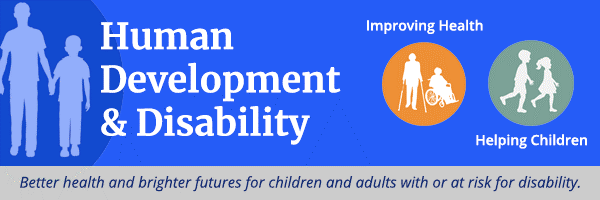DHDD Newsletter – November 2019

A Note from the DHDD Director:
Thanksgiving is only a few days away. As I consider the many things that I am thankful for, I want to say thanks to you, our partners. We cannot accomplish all that we do without your collaboration. Your work and partnership have truly made a difference in the lives of children and adults of all abilities and their families. I wish you a happy and restful week with family and friends!
– Dr. Georgina Peacock, Director, DHDD
In the Spotlight
About One in Three Adults in Rural Communities Lives with a Disability

A new report from the Centers for Disease Control and Prevention and published in American Journal of Preventive Medicine found a significant difference in disability across geography, about one in three adults reports living with a disability in rural counties, compared with about one in five adults in urban counties. Adults with disabilities in rural areas may also face additional barriers like transportation and access to health care that can affect their health, quality of life, and community participation.
These findings serve as reminders that people with disabilities live in all geographic areas. They also highlight the importance of including people with disabilities living in rural communities in the design, implementation and evaluation of public health programs.
Pediatric Mental Healthcare Policies in Emergency Departments

In a new study published in Pediatric Emergency Care, scientists from CDC and partner organizations found that less than half (46.2%) of emergency departments (EDs) have policies in place to care for children with mental health and social concerns. Policies provide structure during and after emergencies, such as weather-related disasters, when EDs are critical for children to get immediate medical and mental health services. This study found that whether an ED had a pediatric mental healthcare policy varied by geographic location, number of pediatric patients, presence of a pediatric emergency care coordinators, and presence of other policies and guidelines.
Publications
Reproductive Health Considerations for Women with I/DD

Whereas progress has been made on increasing access to comprehensive health care for individuals with intellectual and developmental disabilities (I/DD), disparities continue in health outcomes, including those related to the reproductive health of adolescent and adult women with I/DD. A recent literature review by CDC published in Sexuality and Disability summarizes reproductive care considerations for adolescent and adult women with I/DD and current practices regarding the delivery of contraceptive services to these women.
Also, check out some tips for health care providers on how to communicate with female patients with intellectual disabilities about sexual and reproductive health topics.
Commentary: Ensuring the Life-Span Benefits of Newborn Screening

In a recently published commentary in Pediatrics, CDC scientists indicate that newborn screening is a highly successful public health program that has led to major improvements in outcomes for a variety of conditions otherwise associated with long-term disability and even death. In the United States, newborn screening is provided to every newborn, regardless of circumstance, leading to the identification of >13 000 newborns with a significant condition each year. Most of these individuals require specialized care over their life span. However, public health involvement in newborn screening typically ends once the condition has been diagnosed. This can lead to gaps in care and impede the ability to collect the data necessary for quality improvement and assess treatment effectiveness. Several approaches could be implemented to provide adequate follow-up, facilitate prospective research, and improve outcomes.
DHDD in the Field
American Public Health Association Annual Meeting

From left to right: Dr. JoAnn Thierry, Dr. Shannon Griffin-Blake, Melinda Jordan
Presentations by DHDD scientists included:
- Using State-based Disability and Health Programs to Improve Inclusion of People with Disabilities in Type 2 Diabetes Policies, Programs and Interventions; (Presenter: Dr. JoAnn Thierry)
- Collaborative section on physical activity and disability moderated; (Presenter: Dr. Shannon Griffin-Blake)
Association of University Centers on Disability Annual Conference

From left to right: Katie Green, Jasmine Owens, Dr. JoAnn Thierry, Dr. Shannon Griffin-Blake, Jennifer Meunier
Presentations by DHDD scientists included:
- Listening to Voices of the Disability Community Recovering from Disaster; (Presenter: Jennifer Meunier along with panel members from FEMA, National Association of Councils on Developmental Disabilities, and the National Disability Rights Network)
- Reaching People with Disabilities through Healthy Communities: Sharing Successes and Lessons Learned; (Presenter: Dr. Shannon Griffin-Blake)
- Leveraging Communities of Practice to Encourage Inclusion of People with Disabilities in Type 2 Diabetes Prevention Programs; (Presenter: Dr. JoAnn Thierry)
- Panel Improving Health Outcomes for People with Disabilities through National and State-level Programs; (Presenter: Jasmine Owens along with disability and health awardees from Special Olympics, Florida and Kansas)
- Act Early Network event on behalf of the “Learn the Signs. Act Early.” Program; (Host: Katie Green)
DHDD’S mission is to lead inclusive programs to optimize the health and development of children and adults with, or at risk for, disabilities.
